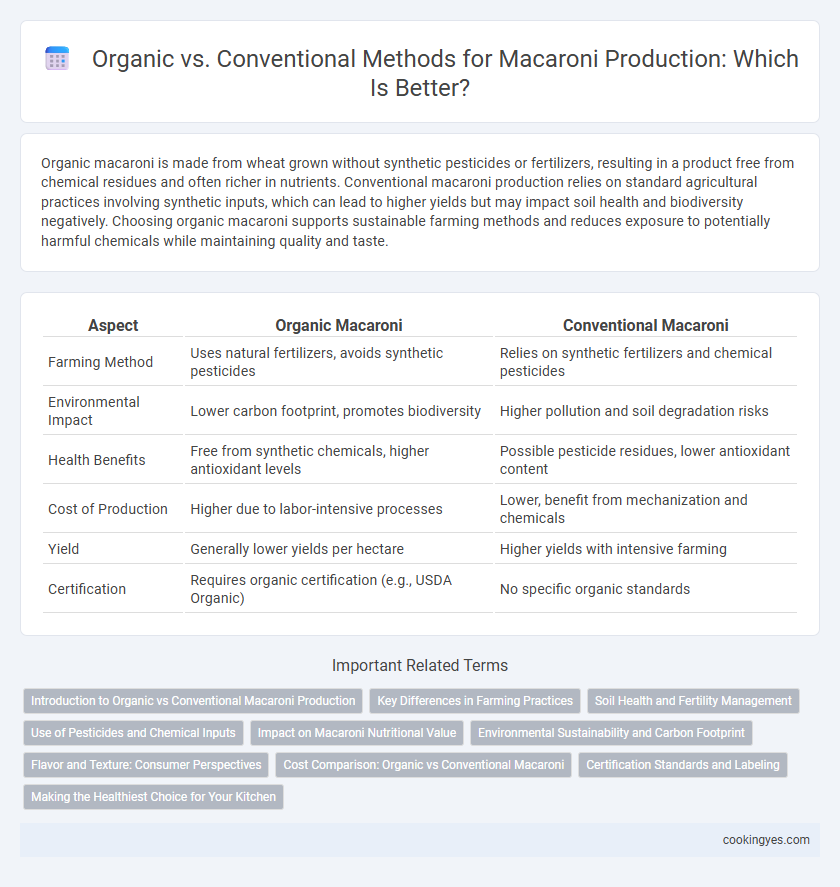Organic macaroni is made from wheat grown without synthetic pesticides or fertilizers, resulting in a product free from chemical residues and often richer in nutrients. Conventional macaroni production relies on standard agricultural practices involving synthetic inputs, which can lead to higher yields but may impact soil health and biodiversity negatively. Choosing organic macaroni supports sustainable farming methods and reduces exposure to potentially harmful chemicals while maintaining quality and taste.
Table of Comparison
| Aspect | Organic Macaroni | Conventional Macaroni |
|---|---|---|
| Farming Method | Uses natural fertilizers, avoids synthetic pesticides | Relies on synthetic fertilizers and chemical pesticides |
| Environmental Impact | Lower carbon footprint, promotes biodiversity | Higher pollution and soil degradation risks |
| Health Benefits | Free from synthetic chemicals, higher antioxidant levels | Possible pesticide residues, lower antioxidant content |
| Cost of Production | Higher due to labor-intensive processes | Lower, benefit from mechanization and chemicals |
| Yield | Generally lower yields per hectare | Higher yields with intensive farming |
| Certification | Requires organic certification (e.g., USDA Organic) | No specific organic standards |
Introduction to Organic vs Conventional Macaroni Production
Organic macaroni production emphasizes the use of organically grown wheat free from synthetic pesticides and fertilizers, ensuring a more environmentally sustainable approach. Conventional macaroni relies on traditionally farmed wheat with possible exposure to chemical inputs and genetically modified organisms (GMOs). The distinction influences not only the nutritional profile but also the environmental impact and consumer preference trends within the pasta market.
Key Differences in Farming Practices
Organic macaroni production relies on natural fertilizers like compost and manure, avoiding synthetic pesticides and chemical fertilizers commonly used in conventional farming. Crop rotation and biological pest control are essential practices in organic farming to maintain soil health and reduce pest incidence. Conventional farming often employs genetically modified seeds and intensive chemical inputs to maximize yield and control pests, which can impact environmental sustainability and soil biodiversity.
Soil Health and Fertility Management
Organic macaroni production relies on natural soil health enhancement techniques such as crop rotation, composting, and organic fertilizers, promoting long-term soil fertility and microbial diversity. Conventional methods often use synthetic fertilizers and chemical pesticides that can lead to soil degradation and reduced microbial activity over time. Sustainable soil fertility management in organic systems supports improved nutrient cycling and soil structure, essential for optimal durum wheat quality used in macaroni production.
Use of Pesticides and Chemical Inputs
Organic macaroni production strictly prohibits the use of synthetic pesticides and chemical fertilizers, relying on natural methods to enhance soil fertility and control pests. Conventional macaroni production often depends on chemical inputs to increase yield and protect crops from pests and diseases, which can leave residues impacting environmental health. Choosing organic macaroni supports reduced chemical exposure and promotes sustainable agriculture through eco-friendly pest management.
Impact on Macaroni Nutritional Value
Organic macaroni production often preserves higher levels of nutrients due to the absence of synthetic pesticides and fertilizers, which can degrade wheat quality. Conventional macaroni made from chemically treated wheat may contain lower levels of essential vitamins and antioxidants. Studies indicate that organic durum wheat, the primary ingredient in macaroni, tends to have increased protein content and richer micronutrient profiles, enhancing overall nutritional value.
Environmental Sustainability and Carbon Footprint
Organic macaroni production emphasizes environmentally sustainable practices by using non-synthetic fertilizers and pesticides, which reduces soil and water pollution compared to conventional methods. Studies show organic wheat cultivation for macaroni generates a significantly lower carbon footprint, primarily due to decreased fossil fuel use and improved soil carbon sequestration. Choosing organic macaroni supports biodiversity and helps mitigate climate change through reduced greenhouse gas emissions across the production lifecycle.
Flavor and Texture: Consumer Perspectives
Organic macaroni often appeals to consumers seeking a richer, more natural flavor profile, attributed to the use of organically grown wheat and the absence of synthetic pesticides. Textural differences may be subtle but noticeable, with organic pasta sometimes offering a firmer bite and less uniform consistency due to less processing. Consumer reviews frequently highlight a preference for the authentic taste and artisanal feel found in organic macaroni compared to the more standardized texture of conventional options.
Cost Comparison: Organic vs Conventional Macaroni
Organic macaroni production involves higher costs due to the use of certified organic wheat, stringent farming practices, and limited pesticide use, resulting in premium-priced raw materials. Conventional macaroni benefits from lower production expenses, thanks to synthetic fertilizers, herbicides, and higher crop yields, which translate to more affordable retail prices. Consumer demand and certification processes further widen the cost gap between organic and conventional macaroni products.
Certification Standards and Labeling
Organic macaroni production adheres to strict certification standards such as USDA Organic and EU Organic, ensuring the use of non-GMO grains, absence of synthetic pesticides, and sustainable farming practices. Conventional macaroni typically lacks these certifications, allowing for synthetic additives and conventional farming inputs. Clear labeling differentiates organic macaroni by highlighting certified organic seals, which guide consumers seeking pesticide-free and environmentally friendly pasta options.
Making the Healthiest Choice for Your Kitchen
Organic macaroni is made from durum wheat grown without synthetic pesticides, herbicides, or chemical fertilizers, reducing exposure to harmful residues. Conventional macaroni may contain traces of these chemicals, potentially affecting overall health and taste quality. Choosing organic macaroni supports sustainable farming practices, ensures higher nutrient retention, and promotes a healthier kitchen environment.
Organic vs Conventional for Macaroni Production Infographic

 cookingyes.com
cookingyes.com